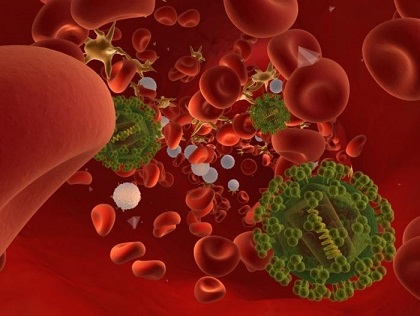HIV News: Researchers Find That A Protein Complex Called SMC5/6 Allows HIV To Evade Antivirals And Immunity
HIV News - SMC5/6 Nov 26, 2022 3 years, 2 months, 4 weeks, 14 hours, 47 minutes ago
HIV News: A new study by researcher from Duke University Medical Center, Durham, North Carolina – USA have found that a protein complex called SMC5/6 allows HIV to evade antivirals and immunity.

To date, it is already known that after viral entry and reverse transcription, HIV-1 proviruses that fail to integrate are epigenetically silenced, but the underlying mechanism has remained unclear.
The study team utilizing a genome-wide CRISPR/Cas9 knockout screen, identified the human host SMC5/6 complex as essential for this epigenetic silencing.
The study findings showed that SMC5/6 binds to and then SUMOylates unintegrated chromatinized HIV-1 DNA.
Interestingly, it was also found that inhibition of SUMOylation, either by point mutagenesis of the SMC5/6 component NSMCE2 ie a SUMO E3 ligase or using the SUMOylation inhibitor TAK-981, prevents epigenetic silencing, enabling transcription from unintegrated HIV-1 DNA and rescues the replication of integrase-deficient HIV-1.
The study findings also showed that blocking SMC5/6 complex expression, or inhibiting its SUMOylation activity, suppresses the establishment of latent HIV-1 infections in both CD4+ T cell lines and primary human T cells.
The study findings show that the SMC5/6 complex plays a direct role in mediating the establishment of HIV-1 latency by epigenetically silencing integration-competent HIV-1 proviruses before integration.
The study findings were published in the peer reviewed journal: Nature Microbiology.
https://www.nature.com/articles/s41564-022-01264-z
The study team concluded that an immune response that likely evolved to help fight infections appears to be the mechanism that drives human immunodeficiency virus (HIV) into a latent state, lurking in cells only to erupt anew.
The study findings provide new insights into the vexing process that makes HIV particularly stealthy, but could also play a role in other viral infections.
Senior author Dr Bryan R. Cullen, Ph.D., a professor in the Department Molecular Genetics and Microbiology at Duke University School of Medicine told reporters at the
HIV News beat of Thailand Medical News, "HIV has proven to be incurable because of a small number of latently HIV-infected T-cells that are untouched by both antiviral drugs and the immune response.”
Dr Cullen further added, "These cells, which are very long lived, can spontaneously emerge from latency and start producing HIV even years after infection, thus necessitating the life-long use of antiretrovirals. The origin of these latently infected cells has remained unknown despite considerable effort."
The study findings offer important insights, pointing to a protein complex called SMC5/6, which is involved in a host cell's chromosome function and repair.
Typically, the HIV virus enters the body, infects the immune system's CD4+ T-cells, then makes a genome-length DNA molecule that it integrates into a host cell chromosome where
it is then copied to generate viral RNAs and proteins.
However, if this so-called DNA provirus is prevented from integrating into the host cell DNA, for example by a drug that blocks this process, then it fails to make any viral RNAs and proteins and becomes inert.
In direct contrast, DNA proviruses that are able to integrate are normally able to drive a productive HIV infection.
The study team found that in a small number of infected cells, the SMC5/6 protein complex initiates a process that silences the DNA provirus before it integrates into a host cell chromosome.
Interestingly, these proviruses remain inert even after integration and result in latent infections, lying low until prompted to erupt into an active infection.
Dr Cullen said, "Our study findings suggests that latency results not from any intrinsic properties of the infecting HIV but rather from an unfortunate side effect of a cellular innate immune response that probably evolved to silence invasive foreign DNA.”
The study team found that a molecule that shuts down SMC5/6's silencing action showed promising results as a potential therapeutic strategy as it inhibited the establishment of latent HIV infections. Reactivated proviruses are vulnerable to natural immune system responses and anti-retroviral drugs.
Dr Cullen added, "Although antiretroviral therapies can reduce the viral load in AIDS patients to below the level of detection, these drugs fail to eradicate HIV-1. While there has been considerable effort expended on trying to develop therapies that can activate latent HIV-1 and help antiretroviral therapies clear the body of infectious virus, this effort has so far failed to identify drugs that are both effective and non-toxic. Our study represents a potentially important step toward achieving this goal."
He further commented, "Clearly, understanding the mechanism that results in HIV-1 latency may provide insights into how latent HIV-1 proviruses can be reactivated and then destroyed.”
The study findings are considered a major breakthrough in HIV research as it could provide solutions to finally eradicate HIV and its viral reservoirs once and for all.
For the latest
HIV News, keep on logging to Thailand Medical News.
